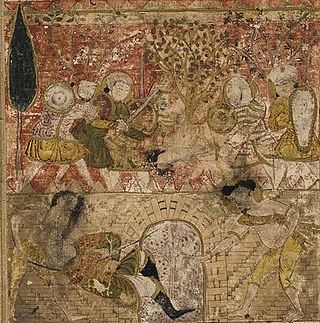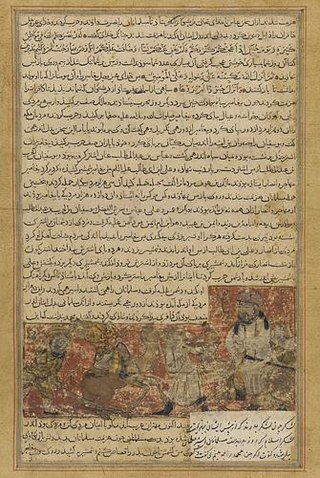Islamic primary sources
The event is partly mentioned in the Quran verse 3:61 [4]
The event is also mentioned by the Muslim Jurist Tabari, as follows:
The Messenger of God sent Khalid b. al-Walid in the month of Rabi' II, or Jumada I, in the year 10/631 to Banu al Harith b. Kab in Najran and ordered to invite them to Islam for three days before he fought them. If they should respond to him [with the acceptance of Islam], then he was to accept it from them, and to stay with them and teach them the Book of God, the sunnah of His prophet, and the requirements of Islam [ma'alim al-islam), if they should decline then he was to fight them.
Khalid departed and came to them, sending out riders in every direction inviting them to Islam and saying, "O people, accept Islam, and you will be safe." So they embraced Islam and responded to his call. Khalid stayed with them, teaching them Islam, the Book of God, and the sunnah of His prophet. Then Khalid wrote to the Messenger of God: "In the name of God, the Compassionate, the Merciful, to Muhammad the Prophet, the Messenger of God, from Khalid b. al-Walid. Peace be upon you, O Messenger of God, and God's mercy and blessings." The Messenger of God wrote to him:570 "In the name of God, the Compassionate, the Merciful, from Muhammad, the Prophet, the Messenger of God, to Khalid b. al-Walid. I praise God, the only God, unto you, the only God.
Now then: O Messenger of God, God bless you. You sent me to the Banu al-Harith b Ka'b and ordered that when i came to them, I should not fight them for three days and that I should Invite them to Islam. [You also ordered that] if they accepted it, I should accept it from them and teach then the requirements of Islam. The Book of God and the Sunnah of His Prophet. If they did not accept Islam, I was to fight them. I came to them and invited them to Islam for three days as the Messenger of God commanded me, and I sent riders among them riders among them [announcing], 'O Banu al-Harith, embrace Islam, and you will be safe.' They have surrendered and did not fight, and I am staying in their midst ordering them [to do] what God has ordered, forbidding them from [doing] what God has forbidden, and teaching them the requirements of Islam and Sunnah of the Prophet, until the Messenger of God writes to me. Peace be upon you, O Messenger of God, and God's mercy and blessings.
The Messenger of God wrote to him: "In the name of God the most compassionate the most merciful, from Muhammad, the Prophet, the Messenger of God, to Khalid b. al-Walid. Peace be upon you. I praise God, the only God, unto you. Now then: Your letter has reached me via a Messenger with news that the Banu al Harith [b. Ka'b] surrender before they fought and responded to your invitation of Islam and pronouncement (of the shahadah) that there is no God, except God alone, who has no associate and that Muhammad is His servant and His Messenger. God has guided them with His guidance, so give them good tidings and warn them and return, and let their deputation come with you. Peace be upon you, and God's mercy and His blessings." Then Khalid b. al-Walid came back to the Messenger of God and with him came the deputation of Banu al-Harith b. Ka'b. Qays b. al-Husayn b. Yazid b. Qanan Dhu al-Ghussah, Yazid b. 'Abd al-Madan,Yazid b. al-Muhajjal, 'Abdallah b. Qurayz , al- Ziyadi, Shadad b. Abdullah al-Qanani, and Amr b. Abdallah al-Dababi were among the delegation.
When they came to the Messenger of God, he saw them and asked who those people were, because they looked like Indians. He was told that they were the Banu al-Harith b. Ka'b. When they stood before the Messenger of God, they greeted him and said, "We testify that you are the Messenger of God and that there is no god but Allah." He replied, "And I testify that there is no god but Allah, and that I am the Messenger of God". Then he said "You are the ones when driven away would push forward." They then became silent and none of them answered him. He repeated it three times and none of them replied.
When he repeated it the fourth time Yazid b. 'Abd al-Madan replied, "Yes, O Messenger of God, we are the ones who, when driven away, pushed forward," and he repeated it four times. The Messenger of God said, "Had Khalid b. al-Walid not written to me that you had surrendered and had not fought, I would have thrown your heads underneath your feet."...
[Tabari, Volume 9, The last Years of the Prophet 82-84] [10]
Tabari said Abdullah ibn Abi Bakr was the narrator of the event. [11] The information of the letters mentioned by Tabari in the above has also been collected by Muhammad Hamidullah (and he considers his letters authentic [7] ). Muhammad Hamidullah collected 6 of Muhammad's letters whose original texts have been preserved, he compiled it in his French book Six Originaux des letters diplomatiques du Prophete e l'Islam. [6] The translator of Tabari, The last Years of the Prophet, Isma'il Qurban Husayn, mentions in the footnote on page 83, that the letter mentioned by Tabari is also in the texts collected by Muhammad Hamidullah. [8]






